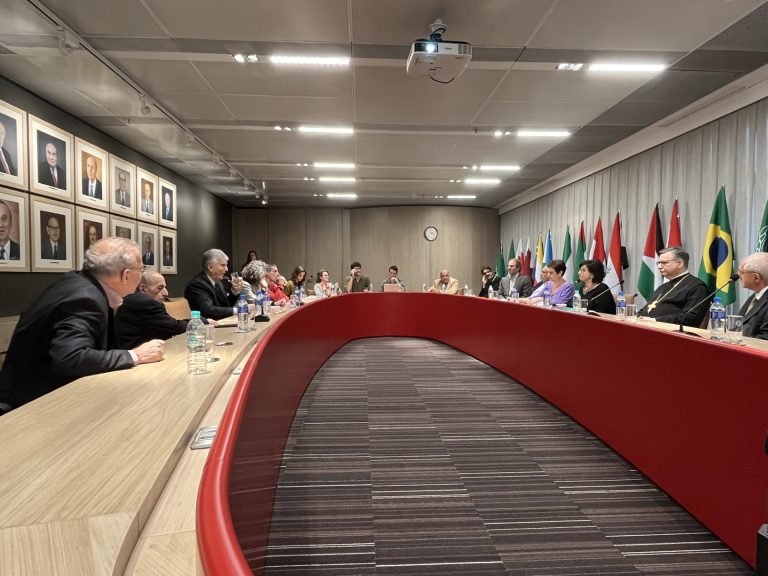São Paulo – The importance of the collection on Arab immigration belonging to families and institutions and its access were two of the leading topics discussed at a meeting with researchers and donors of documents in the headquarters of the Arab-Brazilian Chamber of Commerce (ABCC) in São Paulo on Thursday (18). The Brazil-based institution has partnered up with the Lebanese Holy Spirit University of Kaslik (USEK) for a digitization project of documents on the Arab immigration in Latin America. In other countries, USEK partnered up with other institutions for this initiative.
The scholar meet was attended by Safa Gibran, Arabic and Literature professor at the University of São Paulo; Soraya Smaili, former president and professor of Pharmacology at the Medicine School of the Federal University of São Paulo; Thiago Nicodemo, Director General of the Public Archive of the State of São Paulo; and representatives of Club Homes, Esporte Clube Sírio, Lar Sírio Pró-Infância, and families who donated documents.
Read more: Partnership facilitates research in immigration collection
The Digitization Project of the Memory of Arab Immigration in Brazil digitizes the collection on Arab immigrants in Brazil. Since its launch in 2018, it has digitized 138 books and 50 journals, adding up to 140,000 images. The project relies on donations and openings of document collections to grow. On the other hand, by retrieving immigrant documents, it increases the number of research sources available for scholars.
ABCC Communication & Marketing Vice President Silvia Antibas told the 25 guests at the meeting that the collection the project aims to build is “extremely important and could even change the historiography of Arab immigration”, referring to tales and data that may yet be found.
Access to collection on immigration
A family, person or institution can lend their documents to the ABCC, which by using equipment provided by USEK, digitizes them. The digital file is then stored and shared with USED, which in turn treats the images. The file then is put on a database. The lender of the material is rewarded with a digital version of the document, which is then returned to them.
At the meeting, researchers asked for a facilitated access to this database. A person who develops research on immigration and needs to use the collection now has to thoroughly explain which document they’d like to see and request its sending, which demands a long time for the research process.
This project could change the historiography of Arab immigration
Silvia Antibas, Vice President of Communication & Marketing of the Arab-Brazilian Chamber of Commerce
“It was a very important event as we managed to gather the experiences of all the attendees and listen to suggestions, too. This [digitization and promotion] work is important not just for the Arab immigration, as they said here, but for the history of Brazil,” said Antibas.
Translated by Guilherme Miranda




